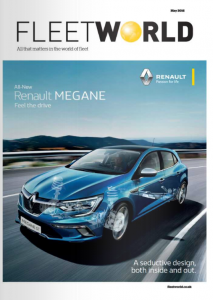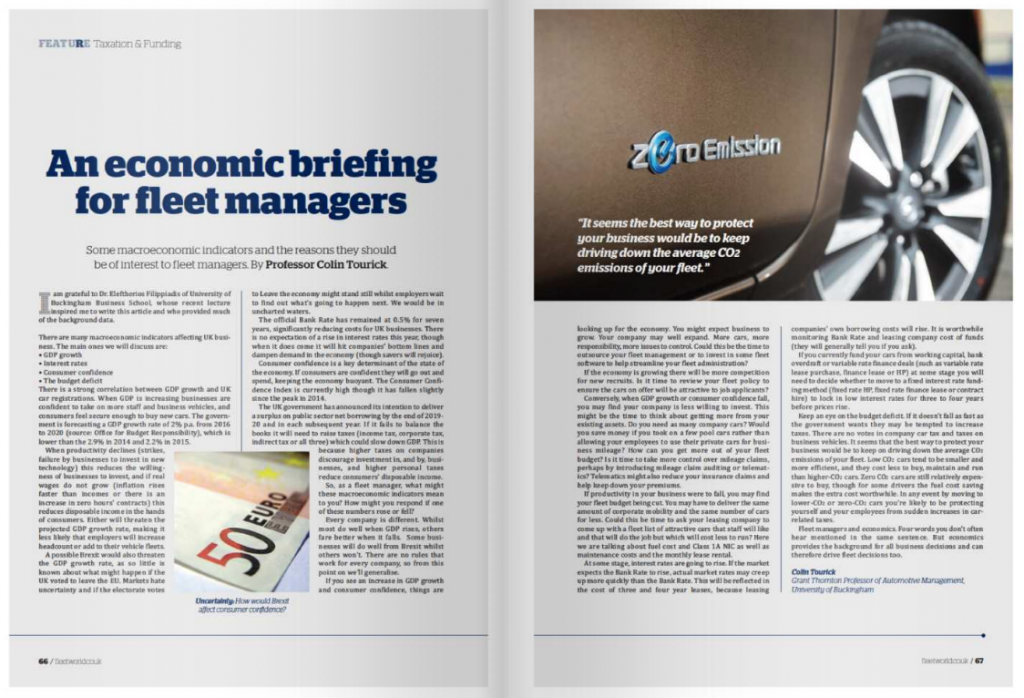
 In this article we will be looking at some macroeconomic indicators and the reasons they should be of interest to fleet managers.
In this article we will be looking at some macroeconomic indicators and the reasons they should be of interest to fleet managers.
I am grateful to Dr. Eleftherios Filippiadis of University of Buckingham Business School, whose recent lecture inspired me to write this article and who provided much of the background data.
There are many macroeconomic indicators affecting UK business. The main ones we will discuss are:
- GDP growth
- Interest rates
- Consumer confidence and
- The budget deficits
There is a strong correlation between GDP growth and UK car registrations. When GDP is increasing businesses are confident to take on more staff and business vehicles, and consumers feel secure enough to buy new cars. The government is forecasting a GDP growth rate of 2% p.a. from 2016 to 2020 (source: Office for Budget Responsibility), which is lower than the 2.9% in 2014 and 2.2% in 2015.
When productivity declines (strikes, failure by businesses to invest in new technology) this reduces the willingness of businesses to invest, and if real wages do not grow (inflation rises faster than incomes or there is an increase in zero hours’ contracts) this reduces disposable income in the hands of consumers. Either will threaten the projected GDP growth rate, making it less likely that employers will increase headcount or add to their vehicle fleets.
A possible Brexit would also threaten the GDP growth rate, as so little is known about what might happen if the UK voted to leave the EU. Markets hate uncertainty and if the electorate votes to Leave the economy might stand still whilst employers wait to find out what’s going to happen next. We would be in uncharted waters.
The official Bank Rate has remained at 0.5% for seven years, significantly reducing costs for UK businesses. There is no expectation of a rise in interest rates this year, though when it does come it will hit companies’ bottom lines and dampen demand in the economy (though savers will rejoice).
Consumer confidence is a key determinant of the state of the economy. If consumers are confident they will go out and spend, keeping the economy buoyant. The Consumer Confidence Index is currently high though it has fallen slightly since the peak in 2014.
The UK government has announced its intention to deliver a surplus on public sector net borrowing by the end of 2019-20 and in each subsequent year. If it fails to balance the books it will need to raise taxes (income tax, corporate tax, indirect tax or all three) which could slow down GDP. This is because higher taxes on companies discourage investment in, and by, businesses, and higher personal taxes reduce consumers’ disposable income.
So, as a fleet manager, what might these macroeconomic indicators mean to you? How might you respond if one of these numbers rose or fell?
Every company is different. Whilst most do well when GDP rises, others fare better when it falls. Some businesses will do well from Brexit whilst others won’t. There are no rules that work for every company, so from this point on we’ll generalise.
If you see an increase in GDP growth and consumer confidence, things are looking up for the economy. You might expect business to grow. Your company may well expand. More cars, more responsibility, more issues to control. Could this be the time to outsource your fleet management or to invest in some fleet software to help streamline your fleet administration?
If the economy is growing there will be more competition for new recruits. Is it time to review your fleet policy to ensure the cars on offer will be attractive to job applicants?
Conversely, when GDP growth or consumer confidence fall, you may find your company is less willing to invest. This might be the time to think about getting more from your existing assets. Do you need as many company cars? Would you save money if you took on a few pool cars rather than allowing your employees to use their private cars for business mileage? How can you get more out of your fleet budget? Is it time to take more control over mileage claims, perhaps by introducing mileage claim auditing or telematics? Telematics might also reduce your insurance claims and help keep down your premiums.
If productivity in your business were to fall, you may find your fleet budget being cut. You may have to deliver the same amount of corporate mobility and the same number of cars for less. Could this be time to ask your leasing company to come up with a fleet list of attractive cars that staff will like and that will do the job but which will cost less to run? Here we are talking about fuel cost and Class 1A NIC as well as maintenance costs and the monthly lease rental.
At some stage, interest rates are going to rise. If the market expects the Bank Rate to rise, actual market rates may creep up more quickly than the Bank Rate. This will be reflected in the cost of three and four year leases, because leasing companies’ own borrowing costs will rise. It is worthwhile monitoring Bank Rate and leasing company cost of funds (they will generally tell you if you ask).
If you currently fund your cars from working capital, bank overdraft or variable rate finance deals (such as variable rate lease purchase, finance lease or HP) at some stage you will need to decide whether to move to a fixed interest rate funding method (fixed rate HP, fixed rate finance lease or contract hire) to lock in low interest rates for 3-4 years before prices rise.
Keep an eye on the budget deficit. If it doesn’t fall as fast as the government wants they may be tempted to increase taxes. There are no votes in company car tax and taxes on business vehicles. It seems that the best way to protect your business would be to keep on driving down the average CO2 emissions of your fleet. Low CO2 cars tend to be smaller and more efficient, and they cost less to buy, maintain and run than higher-CO2 cars. Zero CO2 cars are still relatively expensive to buy, though for some drivers the fuel cost saving makes the extra cost worthwhile. In any event by moving to lower-CO2 or zero-CO2 cars you’re likely to be protecting yourself and your employees from sudden increases in car-related taxes.
Fleet managers and economics. Four words you don’t often hear mentioned in the same sentence. But economics provides the background for all business decisions and can therefore drive fleet decisions too.
Professor Colin Tourick
University of Buckingham Business School
